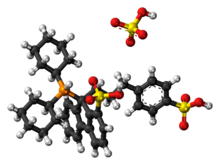
| |

| |
| Names | |
|---|---|
| IUPAC name (±)-Dicyclohexyl-{9--2-sulfonylfluoren-9-yl}phosphonium hydrogensulfate | |
| Other names CataCXium F sulf | |
| Identifiers | |
| CAS Number | |
| 3D model (JSmol) | |
| ChemSpider | |
| ECHA InfoCard | 100.221.684 |
| PubChem CID | |
| CompTox Dashboard (EPA) | |
InChI
| |
SMILES
| |
| Properties | |
| Chemical formula | C34H43O10PS3 |
| Molar mass | 738.87 g/mol |
| Appearance | pale yellow solid |
| Solubility | soluble in water |
| Hazards | |
| GHS labelling: | |
| Pictograms | 
|
| Signal word | Warning |
| Hazard statements | H315, H319, H335 |
| Precautionary statements | P261, P264, P271, P280, P302+P352, P304+P340, P305+P351+P338, P312, P321, P332+P313, P337+P313, P362, P403+P233, P405, P501 |
| Except where otherwise noted, data are given for materials in their standard state (at 25 °C , 100 kPa).
| |
CataCXium F sulf is a water-soluble organophosphorus compound derived from fluorene. The palladium complexes of the respective phosphine show an excellent activity in various palladium-catalyzed coupling reactions, including Suzuki reactions, Sonogashira couplings and Buchwald–Hartwig reactions.
References
- C.A. Fleckenstein; H. Plenio, Highly efficient Suzuki-Miyaura coupling of heterocyclic substrates through rational reaction design. Chemistry-A European Journal 2008, 14(14), 4267–4279.
- C.A. Fleckenstein; H. Plenio, Aqueous/organic cross coupling: Sustainable protocol for Sonogashira reactions of heterocycles. Green Chemistry 2008, 10, 563–570. doi:10.1039/B800154E
- C.A. Fleckenstein; H. Plenio, Efficient Suzuki-Miyaura Coupling of (Hetero)aryl Chlorides with Thiophene- and Furanboronic Acids in Aqueous n-Butanol. Journal of Organic Chemistry 2008, 73, 3236–3244.
- C.A Fleckenstein; R. Kadyrov; H. Plenio, Efficient Large-Scale Synthesis of 9-Alkylfluorenyl Phosphines for Pd-Catalyzed Cross-Coupling Reactions. Organic Process Research & Development 2008, 12, 475–479.
- C.A. Fleckenstein; H. Plenio, Aqueous cross-coupling. Highly efficient Suzuki–Miyaura coupling of N-heteroaryl halides and N-heteroarylboronic acids. Green Chemistry 2007, 9, 1287–1291. doi:10.1039/B711965H